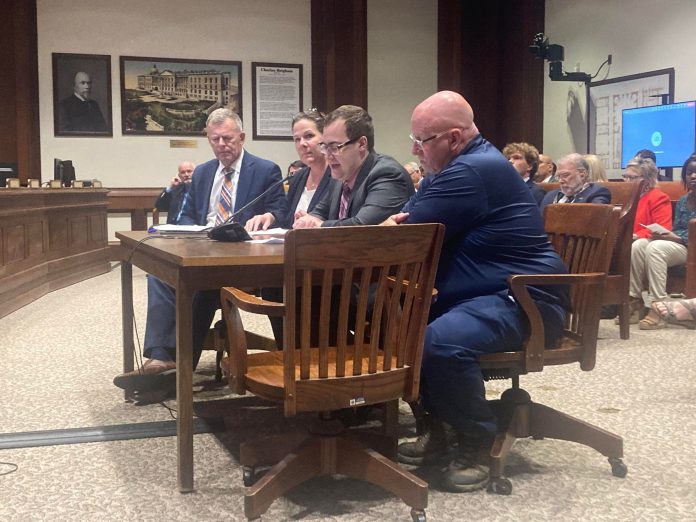abass@northstarreporter.com
Town Manager Michael Borg and Tri-County Regional Superintendent Karen Maguire are asking lawmakers to pass legislation to reduce the costs of construction of vocational schools and increase funding for related programs in Massachusetts.
The two met with the Joint Committee of Education on June 12 and testified in favor of the Act to Improve access, opportunity, and capacity in Massachusetts vocational-technical education. Reps Adam Scanlon (D-North Attleborough) and Frank Moran (D-Lawrence) filed this bill in January 2023 with an identical piece of legislation filed by Sen. Paul Feeney (D-Foxboro) in the Senate.
In their testimony, both Maguire and Borg said the bill would create more opportunities for students who want to work in a trade. Rather than attending traditional schools or colleges, the bill wouldprovide the Massachusetts School Building Authority (MSBA) capital investment funds to raise reimbursement rates for the construction and renovation of vocational-technical and agricultural school infrastructure to expand their capacity . The rates would be increased from 50 to 60 percent to a minimum of 75 and a maximum of 95 percent.
Maguire told the committee schools such as Tri-County do not receive adequate support from the MSBA compared to public schools. She said the programs vocational-technical schools provide require more money for construction and purchasing equipment.
“In a school such as mine, I need to line the walls in the vocational programs with lead,” Maguire said. “You don’t need to do that in comprehensive schools, but with the health and dental and technology X-ray programs that we have, this is something that is required.”
In his testimony, Borg told the committee that 30 percent of Tri-County’s students are from North Attleborough.
He said that number continues to rise, causing wait-lists for vocational-technical schools to grow longer. Borg said raising reimbursement rates would help town finances when paying for construction. The MSBA can reimburse towns for construction, allowing municipalities to avoid having to borrow the MSBA’s share of project costs. By raising the reimbursement rate, the town can receive more funding to afford construction materials.
“Addressing workforce skill gaps, promoting career readiness, meeting industry demands, diverse career pathways, promoting entrepreneurship and innovation, reducing income inequality, and shorter duration and lower cost for education for those electing not to go to college,” Borg said. “It’s clear that North Attleborough and many communities I interact with focus on infrastructure costs that put a strain on our budgets.It is essential to raise the reimbursement rate.”
Also testifying in front of the committee was Andy Rodenhiser, owner of Rhodenhiser Services, a local plumbing, heating, AC, and electrical services company.
A graduate of a vocational school himself, Rodenhiser said the bill would help replenish a workforce where the retirement rate is growing.
“Vocational schools play a vital role in bridging the skills gap, equipping our youth with the necessary hands-on skills and technical knowledge for trade professions,” Rodenhiser said. “As a company, we actively engage with vocational schools.”
Before the bill receives a vote in the House or Senate, the Joint Committee will vote on whether to give it a favorable rating. None of the committee members suggested additional questions or comments for Borg or Maguire.
What are vocational schools and why does this bill matter?
Vocational technical schools teach students specific skills required for a particular job or trade. Examples include carpentry, masonry or electrical repair.
Before serving as senator, Feeney attended Don Bosco Technical High School. He then entered the workforce as an employee of Verizon.
Feeney said the bill helps make Massachusetts a competitive state— an often-repeated phrase by Gov. Maura Healey and legislative leadership. In spoken testimony, Feeney told the committee the trade-based workforce provides jobs for residents in the state and creates new opportunities, such as employing carpenters to build more housing or engineers to build wind turbines.
“It is my absolute belief we should be using all our resources as possible to expand our Massachusetts economy,” Feeney said. “I want every student in my district to have access to these programs.”
According to the Massachusetts Department of Education, it’s estimated that more than 37,000 students enrolled in vocational schools in 2023.
Of the 28 regional vocational technical high schools, however, only Cape Cod Technical High School in Harwich and Minuteman Regional Vocational Technical High School in Lexington have been rebuilt.
Rebuilding projects have become expensive due to inflation fueling a rise in construction costs, but reimbursement rates have stayed the same, with some as low as 48 percent. Scanlon said the legislature must do more to address this by increasing these rates
“Our vocational schools are laboratories of innovation in our commonwealth,” Scanlon said. “What chances do voc-tech schools have to keep up?”
Who supports this bill?
Including Scanlon, Feeney, and Moran, the bill has 62 co-sponsors from the House and the Senate. The bill also has bipartisan support, with Senate Minority Leader Bruce Tarr (R-Gloucester) and Rep. Jay Barrows (R-Mansfield) also listed as petitioners.
House Speaker Ronald Mariano (D-Quincy) did not comment on if he supported the bill while Senate President Karen Spilka (D-Ashland) said she had not seen it yet.
“I haven’t looked in depth at that one particular bill yet,” Spilka said before adding, “I think any bill that particularly helps with housing with individuals and families is certainly important to take a hard look at.”
Scanlon, however, remains confident the bill will receive a favorable recommendation from the committee.
“The bill will be a win for all of our students, and it will be a win for workforce development and the businesses of
our state,” he said. We need to provide our students of today with these opportunities in order to equip our workforce with the skills for tomorrow.”





